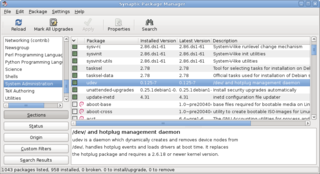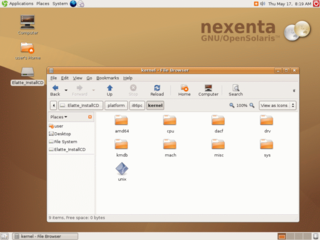
Debian, also known as Debian GNU/Linux, is a Linux distribution composed of free and open-source software and optionally non-free firmware or software developed by the community-supported Debian Project, which was established by Ian Murdock on August 16, 1993. The first version of Debian (0.01) was released on September 15, 1993, and its first stable version (1.1) was released on June 17, 1996. The Debian Stable branch is the most popular edition for personal computers and servers. Debian is also the basis for many other distributions that have different purposes, like Proxmox for servers, Ubuntu or Linux Mint for desktops, Kali for penetration testing, and Pardus and Astra for government use.

A Linux distribution is an operating system made from a software collection that includes the Linux kernel and often a package management system. They are often obtained from the website of each distribution, which are available for a wide variety of systems ranging from embedded devices and personal computers to servers and powerful supercomputers.
Sorcerer was a source-based Linux distribution. The distribution downloads and compiles source code to install and update installed software.

A package manager or package-management system is a collection of software tools that automates the process of installing, upgrading, configuring, and removing computer programs for a computer in a consistent manner.

Advanced package tool, or APT, is a free-software user interface that works with core libraries to handle the installation and removal of software on Debian and Debian-based Linux distributions. APT simplifies the process of managing software on Unix-like computer systems by automating the retrieval, configuration and installation of software packages, either from precompiled files or by compiling source code.
dpkg is the software at the base of the package management system in the free operating system Debian and its numerous derivatives. dpkg is used to install, remove, and provide information about .deb packages.
deb is the format, as well as filename extension of the software package format for the Debian Linux distribution and its derivatives.
Installation of a computer program, is the act of making the program ready for execution. Installation refers to the particular configuration of software or hardware with a view to making it usable with the computer. A soft or digital copy of the piece of software (program) is needed to install it. There are different processes of installing a piece of software (program). Because the process varies for each program and each computer, programs often come with an installer, a specialised program responsible for doing whatever is needed for the installation. Installation may be part of a larger software deployment process.
Dependency hell is a colloquial term for the frustration of some software users who have installed software packages which have dependencies on specific versions of other software packages.
gPHPedit is a discontinued UTF-8-compatible IDE for web development in PHP using the GNOME desktop environment. gPHPedit is built using Scintilla. It was originally written by Andy Jeffries, and was maintained by Anoop John. It is similar to gedit with the difference that it is designed for PHP and HTML text editing. The last version is 0.9.91, released on July 5, 2006. It is free software licensed under the terms of the GNU General Public License (GPL),

debconf is a software utility for performing system-wide configuration tasks on Unix-like operating systems. It is developed for the Debian Linux distribution, and is closely integrated with Debian's package management system, dpkg.
dselect is a computer program used to manage software packages in the Debian operating system.

Nexenta OS, officially known as the Nexenta Core Platform, is a discontinued computer operating system based on OpenSolaris and Ubuntu that runs on IA-32- and x86-64-based systems. It emerged in fall 2005, after Sun Microsystems started the OpenSolaris project in June of that year. Nexenta Systems, Inc. initiated the project and sponsored its development. Nexenta OS version 1.0 was released in February 2008.
A software repository, or repo for short, is a storage location for software packages. Often a table of contents is also stored, along with metadata. A software repository is typically managed by source or version control, or repository managers. Package managers allow automatically installing and updating repositories, sometimes called "packages".
The Debian build toolchain is a collection of software utilities used to create Debian source packages (.dsc) and Debian binary packages from upstream source tarballs.

RPM Package Manager (RPM) is a free and open-source package management system. The name RPM refers to the .rpm file format and the package manager program itself. RPM was intended primarily for Linux distributions; the file format is the baseline package format of the Linux Standard Base.
Cppcheck is a static code analysis tool for the C and C++ programming languages. It is a versatile tool that can check non-standard code. The creator and lead developer is Daniel Marjamäki.
A delta update is a software update that requires the user to download only those parts of the software's code that are new, or have been changed from their previous state, in contrast to having to download the entire program. The use of delta updates can save significant amounts of time and computing bandwidth. The name "delta" derives from the mathematical science use of the Greek letter delta, Δ or δ to denote change.






